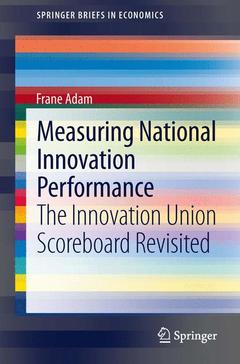Description
Measuring National Innovation Performance, 2014
The Innovation Union Scoreboard Revisited
SpringerBriefs in Economics Series
Language: English
Subject for Measuring National Innovation Performance:
Publication date: 10-2013
74 p. · 15.5x23.5 cm · Paperback
74 p. · 15.5x23.5 cm · Paperback
Description
/li>Contents
/li>Biography
/li>Comment
/li>
This book provides a critical re-examination of the Innovation Union Scoreboard (IUS) as the main tool used by the European Commission and other policy-making bodies to measure national innovation capacity. Given that contemporary societies and economies are to a great extent characterised by the processes of production, dissemination and application (re-combination) of knowledge, the accurate monitoring and measurement of R&D efficiency and innovation performance on national, regional and firm level are of outmost importance. The contextual reconstruction of the model of indicators used by IUS reveals that the accuracy and validity of measurement are not satisfactory, and that substantial modifications of metrics are needed to achieve stronger theoretical significance and policy-relevance. In this work, the »epistemic turn« is emphasised and offered as an alternative, namely in the sense of the shift from a mechanicist-positivist orientation toward a more reflective and contextual post-positivist approach. ?
1 Introduction.- 2 Methodological and Epistemic Framework: From Positivism to Post-positivism.- 3 Innovation: Measurement and Indicators.- 4 Innovation Union Scoreboard: Central Monitoring System for the EU.- 5 Country Profiles and Patterns Regarding Innovation Performance.- 6 Some Comparisons with Other Scoreboards.- 7 On Policy Implications.- 8 Concluding Remarks.
Frane Adam is Professor at the University of Ljubljana and Head of Research at the private, non-profit Institute for Developmental and Strategic Analyses in Ljubljana (www.institut-irsa.si). His main recent research interest is focused on socio-cultural dimensions of innovation performance and knowledge transfer.
Contributes to the synthetic overview of (cross-) national innovation performance Proposes more reliable and theoretically valid indicators/indexes Addresses methodological shortcomings and quality of data by utilising meta-analysis and triangulation Revitalises the discussion on innovation performance research and policies ? Includes supplementary material: sn.pub/extras
© 2024 LAVOISIER S.A.S.

